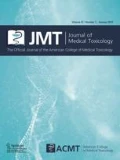Abstract
Introduction
Therapeutic acetaminophen (APAP) ingestion causes asymptomatic drug–induced liver injury in some patients. In most cases, elevations in alanine aminotransferase (ALT) are transient and return to the normal range, even with continued APAP ingestion, though ALT elevation persists in some patients unpredictably. The etiology of this liver injury or adaption is unclear. Our objective was to identify new pharmacogenomic variants associated with elevated ALT or elevated protein adduct concentrations in patients receiving therapeutic acetaminophen.
Methods
We performed genome-wide sequencing analysis on eight patients using leftover blood samples from an observational study that administered four grams of acetaminophen for up to 16 days to all patients. Two patients with ALT elevations > two times the upper limit of normal, two patients with no adduct formation, and four control patients were sequenced. The genomes were aligned with the GRCh38 reference sequence, and variants with predicted low, moderate, or high impact on the subsequent proteins were first manually curated for biologic plausibility, then organized and examined in the REACTOME pathway analysis program.
Results
We found 394 variants in 107 genes associated with elevated ALT. Variants associated with ALT elevation predominantly involved genes in the immune system (MHC class II complex genes), endoplasmic reticulum stress response (SEC23B and XBP1), oxidative phosphorylation (NDUFB9), and WNT/beta-catenin signaling (FZD5). Variants associated with elevated adducts were primarily in signal transduction (MUC20) and DNA repair mechanisms (P53).
Conclusions
While underpowered, genetic variants in immune system genes may be associated with drug-induced liver injury at therapeutic doses of acetaminophen.


Similar content being viewed by others
References
Watkins PB, Kaplowitz N, Slattery JT, Colonese CR, Colucci SV, Stewart PW, et al. Aminotransferase elevations in healthy adults receiving 4 grams of acetaminophen daily: a randomized controlled trial. JAMA. 2006;296(1):87–93.
Heard K, Green JL, Anderson V, Bucher-Bartelson B, Dart RC. A randomized, placebo-controlled trial to determine the course of aminotransferase elevation during prolonged acetaminophen administration. BMC Pharmacol Toxicol. 2014;15:39.
Dart RC, Bailey E. Does therapeutic use of acetaminophen cause acute liver failure? Pharmacotherapy. 2007;27(9):1219–30.
Fontana RJ. Pathogenesis of idiosyncratic drug-induced liver injury and clinical perspectives. Gastroenterology. 2014;146(4):914–28.
Heard KJ. Acetylcysteine for acetaminophen poisoning. N Engl J Med. 2008;359(3):285–92.
Davern TJ 2nd, James LP, Hinson JA, et al. Measurement of serum acetaminophen-protein adducts in patients with acute liver failure. Gastroenterology. 2006;130(3):687–94.
Court MH, Freytsis M, Wang X, et al. The UDP-glucuronosyltransferase (UGT) 1A polymorphism c.2042C>G (rs8330) is associated with increased human liver acetaminophen glucuronidation, increased UGT1A exon 5a/5b splice variant mRNA ratio, and decreased risk of unintentional acetaminophen-induced acute liver failure. J Pharmacol Exp Ther. 2013;345(2):297–307.
Court MH, Peter I, Hazarika S, Vasiadi M, Greenblatt DJ, Lee WM, et al. Candidate gene polymorphisms in patients with acetaminophen-induced acute liver failure. Drug Metab Dispos. 2014;42(1):28–32.
Heruth DP, Shortt K, Zhang N, Li DY, Zhang LQ, Qing Ye S. Genetic Association of Single nucleotide polymorphisms with acetaminophen-induced hepatotoxicity. J Pharmacol Exp Ther. 2018;367(1):95–100.
Navarro SL, Chen Y, Li L, Li SS, Chang JL, Schwarz Y, et al. UGT1A6 and UGT2B15 polymorphisms and acetaminophen conjugation in response to a randomized, controlled diet of select fruits and vegetables. Drug Metab Dispos. 2011;39(9):1650–7.
Ueshima Y, Tsutsumi M, Takase S, Matsuda Y, Kawahara H. Acetaminophen metabolism in patients with different cytochrome P-4502E1 genotypes. Alcohol Clin Exp Res. 1996;20(1 Suppl):25A–8A.
Bushel PR, Fannin RD, Gerrish K, Watkins PB, Paules RS. Blood gene expression profiling of an early acetaminophen response. Pharm J. 2017;17(3):230–6.
Lek M, Karczewski KJ, Minikel EV, et al. Analysis of protein-coding genetic variation in 60,706 humans. Nature. 2016;536(7616):285–91.
Sidiropoulos K, Viteri G, Sevilla C, Jupe S, Webber M, Orlic-Milacic M, et al. Reactome enhanced pathway visualization. Bioinformatics. 2017;33(21):3461–7.
Kusama H, Kon K, Ikejima K, Arai K, Aoyama T, Uchiyama A, et al. Sodium 4-phenylbutyric acid prevents murine acetaminophen hepatotoxicity by minimizing endoplasmic reticulum stress. J Gastroenterol. 2017;52(5):611–22.
Yehia L, Niazi F, Ni Y, Ngeow J, Sankunny M, Liu Z, et al. Germline heterozygous variants in SEC23B are associated with Cowden syndrome and enriched in apparently sporadic thyroid cancer. Am J Hum Genet. 2015;97(5):661–76.
Jiang J, Briede JJ, Jennen DG, et al. Increased mitochondrial ROS formation by acetaminophen in human hepatic cells is associated with gene expression changes suggesting disruption of the mitochondrial electron transport chain. Toxicol Lett. 2015;234(2):139–50.
Wright SC, Canizal MCA, Benkel T, et al. FZD5 is a Galphaq-coupled receptor that exhibits the functional hallmarks of prototypical GPCRs. Sci Signal. 2018;11(559). https://doi.org/10.1126/scisignal.aar5536.
Dadhania VP, Bhushan B, Apte U, Mehendale HM. Wnt/beta-catenin signaling drives thioacetamide-mediated heteroprotection against acetaminophen-induced lethal liver injury. Dose-Response. 2017;15(1):1559325817690287.
Gerbal-Chaloin S, Dume AS, Briolotti P, et al. The WNT/beta-catenin pathway is a transcriptional regulator of CYP2E1, CYP1A2, and aryl hydrocarbon receptor gene expression in primary human hepatocytes. Mol Pharmacol. 2014;86(6):624–34.
Cullen M, Perfetto SP, Klitz W, Nelson G, Carrington M. High-resolution patterns of meiotic recombination across the human major histocompatibility complex. Am J Hum Genet. 2002;71(4):759–76.
Fannin RD, Gerrish K, Sieber SO, Bushel PR, Watkins PB, Paules RS. Blood transcript immune signatures distinguish a subset of people with elevated serum ALT from others given acetaminophen. Clin Pharmacol Ther. 2016;99(4):432–41.
Hautekeete ML, Horsmans Y, Van Waeyenberge C, et al. HLA association of amoxicillin-clavulanate-induced hepatitis. Gastroenterology. 1999;117(5):1181–6.
O'Donohue J, Oien KA, Donaldson P, et al. Co-amoxiclav jaundice: clinical and histological features and HLA class II association. Gut. 2000;47(5):717–20.
Robinson J, Halliwell JA, Hayhurst JD, Flicek P, Parham P, Marsh SGE. The IPD and IMGT/HLA database: allele variant databases. Nucleic Acids Res. 2015;43(Database issue):D423–31.
Funding
The parent study was funded by Johnson and Johnson. A.A.M. received support from NIH 1R35GM124939 and NIH CTSI UL1 TR001082 for this work.
Author information
Authors and Affiliations
Corresponding author
Ethics declarations
Conflict of Interest
None
Additional information
Supervising Editor: Mark B. Mycyk, MD
Publisher’s Note
Springer Nature remains neutral with regard to jurisdictional claims in published maps and institutional affiliations.
Rights and permissions
About this article
Cite this article
Monte, A.A., Sonn, B., Saben, J. et al. The Genomics of Elevated ALT and Adducts in Therapeutic Acetaminophen Treatment: a Pilot Study. J. Med. Toxicol. 17, 160–167 (2021). https://doi.org/10.1007/s13181-020-00815-2
Received:
Revised:
Accepted:
Published:
Issue Date:
DOI: https://doi.org/10.1007/s13181-020-00815-2




